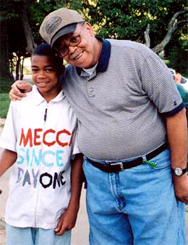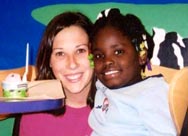| |


|
|
Sustaining
Amachi Beyond Federal Funding
In
Fall 2003, Big Brothers Big Sisters of Eastern Missouri (BBBSEMO) received
its first round of federal funding from the Department of Health and Human
Services for its Amachi program. Since then, the agency has focused on
sustaining and growing the program. “When we’re starting any
kind of new project we really think about what do we need to do to make
[the] program successful and continue it as one of our core programs,”
says Kristen Slaughter, senior director of administration for BBBSEMO.
To date, BBBSEMO has served more than 300 children and has completed Program
Outcome Evaluations (POE) on each child.
The sustainability task list included targeting a wide scope of federal
and state funding sources, as well as private foundations. However, in
order to receive funding from these sources, the agency had to supply
outcomes. “Funders don’t just want to hear a good story, but
they also want the results,” says Slaughter.
Completed
by the caregiver, child and teacher, each POE includes 21 indicators that
fall into three areas: confidence, competence and caring. It tracks metrics
such as improvement in grades, school attendance, attitudes and behaviors.
Using them, we are “able to show funders of the 300 children we’ve
served in our Amachi program: here are the improvements that they’ve
made in these 21 areas,” says Slaughter.
When thinking about sustainability, many agencies focus solely on securing
grants and soliciting private donations, but BBBSEMO believes that creating
and maintaining key partnerships is just as important. For instance, the
agency has developed close ties with Missouri’s Department of Corrections
and will potentially be written into their budget at the state level,
says Slaughter. Not only will this provide additional monetary resources
for the Amachi program, but the relationship also will help ensure long-term
recruitment of participating children.
BBBSEMO has also created partnerships with the state’s attorney
general, the U.S. attorney’s office, and the local police chief.
“Those three individuals have all said at different times that working
with Big Brothers Big Sisters is like working with their best partner
to reduce crime so to speak,” says Vicki Biggs, vice president for
marketing and communications at BBBSEMO.
Some of the partnerships, such as the relationship with the local police
chief, have developed into board positions, a critical component of program
sustainability. “Make sure that your board is comprised of people
who can help you open doors and make introductions,” says Biggs.
“It’s our board that we really use. They are there to help
introduce us to donors and volunteer sources and referral sources. They’re
a very active, involved, and committed board.”
The agency’s board played a crucial role at a recent Amachi Celebration
event that BBBSEMO held at the governor’s mansion. Although BBBSEMO
had the full support of the former governor, the agency as a whole did
not have a relationship with the current one, who took office in January.
However, many of the BBBSEMO board members do have connections with him
and throughout the year kept him informed him about Amachi. The celebration
at the mansion gave BBBSEMOs CEO and President Becky James-Hatter a chance
to discuss the program firsthand with the governor.
“It’s one thing to be able to have an event at the governor’s
mansion,” says Biggs. “It’s another thing to have him
be there. It speaks to the fact that we have great relationships in place
with people that he knows, since he didn’t know us personally.”
|
|





